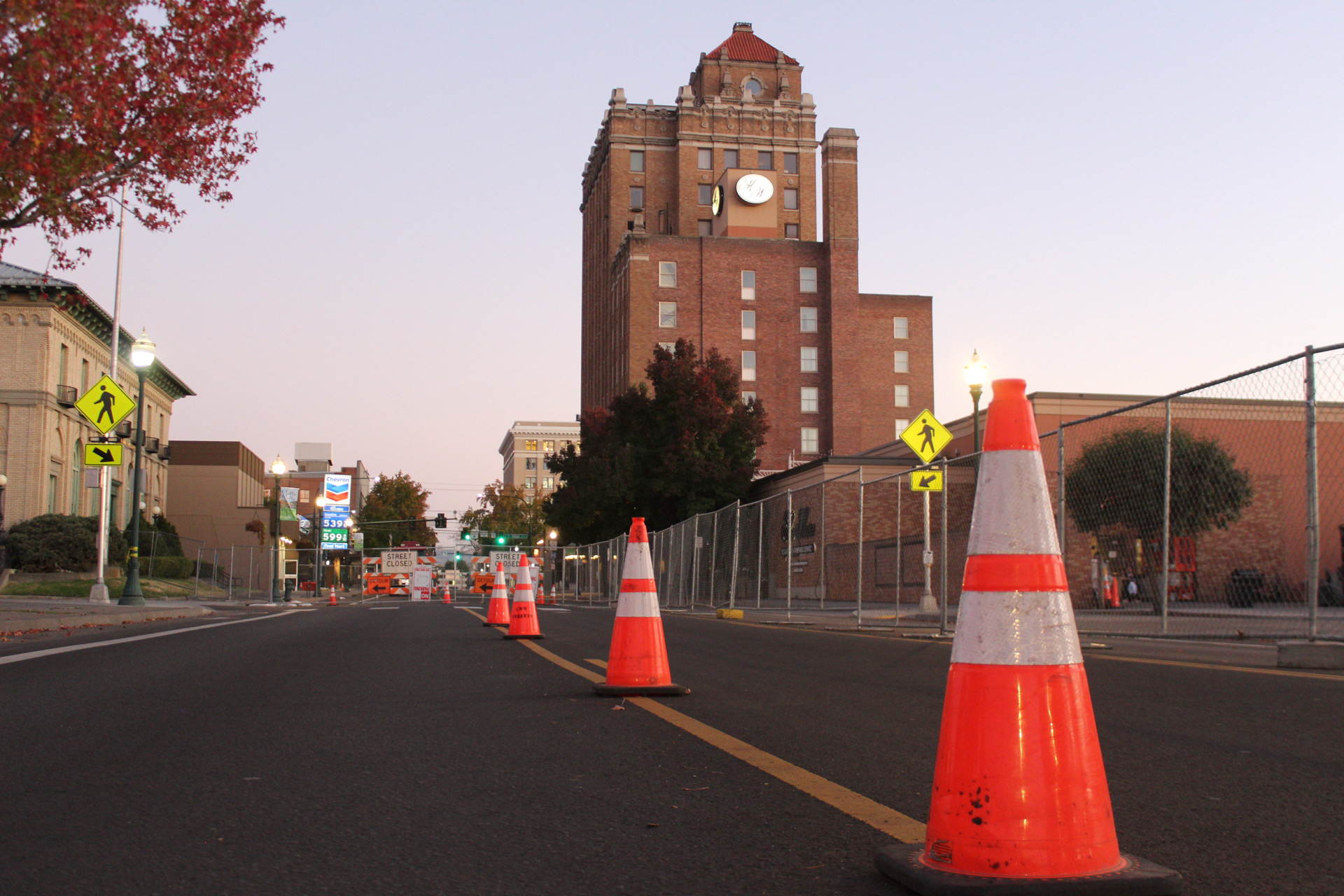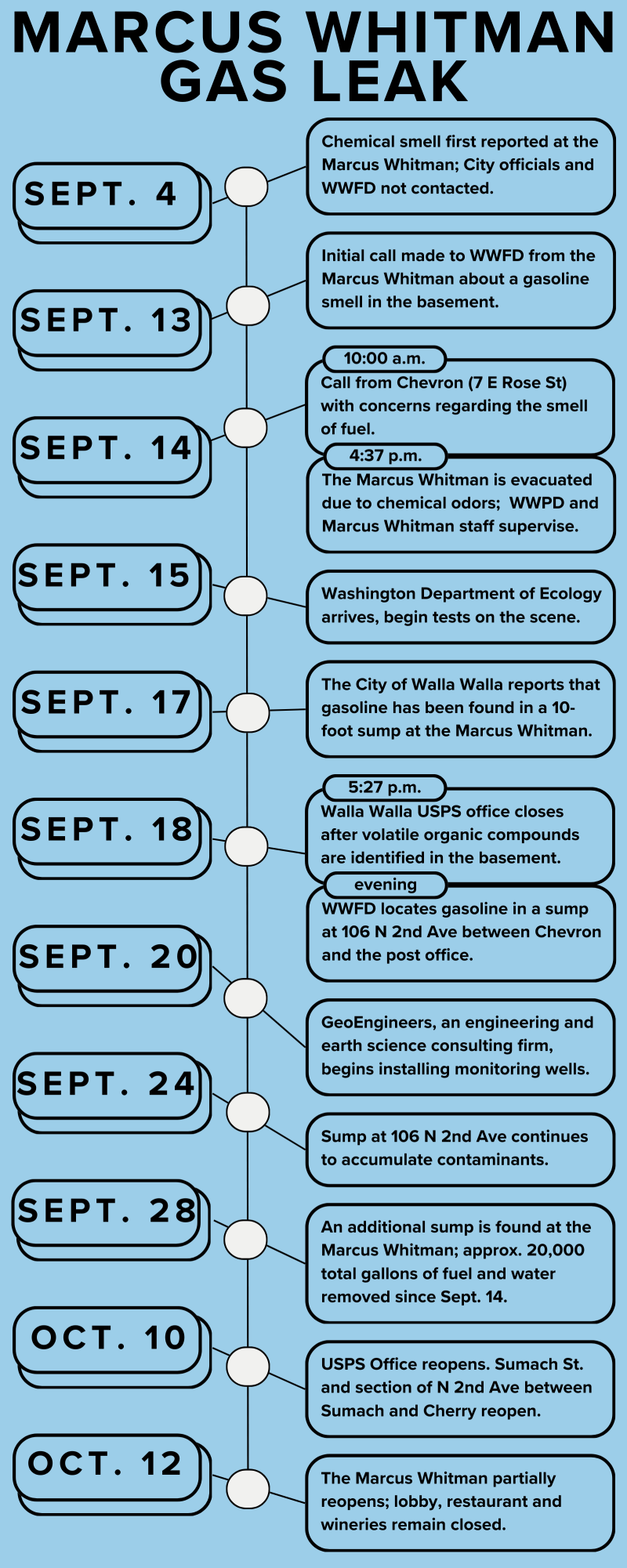
The Marcus Whitman Hotel & Conference Center evacuated on Sept. 14 due to a mysterious chemical odor in their basement, and remained closed for almost a month. Since then, the City of Walla Walla, the Washington Department of Ecology and a privately contracted company, Clean Harbors Environmental Services, have been dealing with the hazardous cleanup from a large underground gasoline leak.

The Marcus Whitman reopened the hotel portion of the business on Oct. 12. The lobby, The Marc Restaurant and the Vineyard Lounge remain closed as of press time on Oct. 18.
The Wire has obtained nearly 400 documents via public records requests related to the gas leak from the City of Walla Walla and the Department of Ecology.
Since the evacuation and subsequent investigation of a sump in the basement of the Marcus Whitman, several other low-elevation sites with contaminated products have been found in neighboring buildings, including the Walla Walla Post Office. A sump collects and pushes water out of low-lying spaces; in this instance, the sump was used to contain accumulated water from beneath the Marcus Whitman.
Over 86,200 gallons of water have been discharged to the Walla Walla wastewater treatment plant following the extensive treatment and testing of pumped contamination plume material, ensuring the gasoline is fully removed.
The treatment process undertaken by Clean Harbors involves frac tanks — for storage and skimming of easily separated product — and a granulated activated carbon (GAC) system that traps contaminants — including volatile organic compounds (VOCs) — from the water. Once gasoline derivatives are no longer detectable through lab tests, the water is sent into the wastewater treatment system at a rate of 15 gallons per minute.
Exposure to a gasoline leak, either through VOCs in the air or dissolved chemicals in the groundwater provide significant risks to public health.
Accumulated VOCs, like the carcinogen benzene, cause symptoms ranging from nose and throat irritation, headaches and loss of coordination to damage to the central nervous system. High concentrations of evaporated gasoline are also extremely flammable and easily ignite when accumulated in enclosed, poorly ventilated spaces — like a basement or an unoccupied building.
An incident report filed by WWFD obtained by The Wire shows that benzene levels in the air at the entrance of the area of origin — the location holding the sump — were recorded at 32 parts per million (ppm) on Sept. 14 at 7:20 p.m. Below the sump, levels were recorded at 38ppm. The Washington State Department of Labor identifies the 8-hour permissible limit for benzene as 1ppm; the 15-minute limit is 5ppm.
Following ventilation of the area, benzene levels returned to acceptable limits.
Another danger to humans near an environmental contaminant is drinking water. At Whitman, the drinking water comes from higher in the mountains, so a subsurface gasoline leak poses little threat to the water supply. Those who live further out of town with wells are at higher risk should the plume go untreated.
Associate Professor of Geology Nick Bader noted that the contaminants would have to spread much further in order to affect many groundwater wells.
“In the city, there’s municipal water that’s supplied to everybody, but outside the city there’s lots of people with wells that they are using for their drinking water supply. So obviously that would be bad. I think the issue is you just don’t want the problem to spread” Bader said.
In a statement to The Wire, David Gavaldon, General Manager of the Marcus Whitman Hotel, explained why they evacuated the hotel.
“The Walla Walla Fire Department advised us that due to the chemical odors reaching an unsafe level in the surrounding community, evacuation of the Marcus Whitman was strongly advised. Our team safely relocated guests and residents to hotels in the area on Thursday, Sept. 14 to ensure their health and safety … The health and safety of our guests, team members and residents remain our primary concern and we will continue to work with the fire department and Department of Ecology to ensure a safe reopening in the near future,” Gavaldon said.
When a potentially severe environmental hazard is noticed, such as the smell of gasoline present in a building, the Washington State Department of Ecology encourages reporting of the situation as soon as possible. The sooner an incident is reported, the quicker they can act to reduce environmental damage and protect natural resources. Documents obtained by The Wire indicate that federal agencies were informed in addition to regional ones after the incident was reported to the Environmental Protection Agency’s National Response Center by the Washington State Department of Ecology.
The Department of Ecology states that emergency situations such as hazardous substance spills must be reported immediately, and has specific guidelines for reporting leaking gasoline from Underground Storage Tanks (USTs), since leaks are a common environmental concern, especially given the average age of USTs. Reporting metrics include the possibility of media interest.
Given the size and location of the gas leak and the particular gasoline derivatives found under the Marcus Whitman, a UST in active use is likely to have caused the issue.
As the groundwater in Walla Walla’s underground aquifer is moving east to west, the Chevron gas station across the street has been identified as the most likely cause of contamination. Fingerprint testing of gasoline pumped from under the Marcus Whitman indicates a 99% likelihood that the spill originated from Chevron’s storage tanks. The Circle K on N 2nd Ave was also considered as a possible source of contamination early in the investigation.
The Marcus Whitman Hotel contacted both Clean Harbors Environmental Services, a private contractor, and the Walla Walla Fire Department, on Sept. 14, the same day the hotel was evacuated.
In a statement to The Wire, a spokesperson for the hotel described when they first started smelling the gas, and how they responded.
“Clean Harbors was contacted on Sept. 14, hours before the Walla Walla Fire Department. We were immediate in our response to investigate the smell and ensure the health and safety of our guests which led to an immediate evacuation of the hotel,” they said.
Jason Fox, the General Manager and Winemaker for Locati Cellars, one of the four wineries with a location inside the Marcus Whitman, also noticed the prominent smell of gasoline on the morning of Sept. 14, the same day the hotel was evacuated. In an email to The Wire, Fox noted other employees noticed the smell before the date of the evacuation.
“I’m not sure when we first smelled it, but I know for sure at 10 AM that morning that I walked in and smelled it immediately. They had the doors of the hotel propped open, trying to vent the place, and I just assumed that maybe someone spilled gas across the street. A resident of the hotel and one of the chefs told me that they smelled it for several days beforehand,” said Fox.
According to a City report obtained by The Wire from Leah Rohan, a City-employed environmental engineer, staff at the Marcus Whitman had been smelling gas since Labor Day.
“Jared Jones, City Wastewater Lead, called me to report that Ed Brown with the Marcus Whitman reported that they are encountering gasoline/exhaust odors in their basement and had been since Labor Day [the previous week],” said Rohan in the report.
According to an anonymous source who works in a winery located in the hotel, the smell of gasoline had been present since Sept. 3, close to two weeks before the evacuation.
Before the hotel was evacuated 11 days later on Sept. 14, the employee mentioned smelling gasoline to several people, including a manager, all of whom brushed off their concerns.
“So I just cranked up the AC. Then that entire weekend it still kept smelling like gas and I was really surprised that not one of the customers that came in that weekend said something. I kept expecting people to walk in and be like, ‘Oh my God, why does it reek of gasoline in here? Why does it smell like somebody parked a boat in here?’” the source said.
Documents acquired by The Wire include an incident report based on a phone call from before 10:10am on Sept. 13. That report explains that employees at the Marcus Whitman reported gasoline and/or exhaust odors in their basement starting Labor Day, Sept. 4, nearly two weeks prior to the hotel’s evacuation.
The employee also noticed the smell got worse over time, up until the date of the evacuation when the smell was most prominent.
“And then after that Sunday, it definitely felt like it was just getting more [and more] intense in terms of the smell and where it was, and it was spreading out more,” the source said.
As the smell got worse inside the hotel, underground the leak continued to grow, and contaminants seeped into the groundwater. By the time the leak was caught and investigated, the smell of gasoline was severe even on the street outside the hotel.
“I don’t know what to do anymore, because everybody kind of keeps saying, ‘Oh, it’s fine, we’re working on it, don’t worry about it.’ And it just reeks everywhere, indoor, outdoor,” the source said.
Due to the volume of fuel that Chevron is capable of storing in its three 10,000-gallon USTs — two holding gasoline and another with diesel — and that their tanks have been refilled at least once since the smell began, a significant amount of product is now mixed into the groundwater in a plume diffusing beneath the city to the northwest.
Professor of Chemistry Frank Dunnivant stressed the severity and possible length of the cleanup. Given how much product leeched into groundwater, and how far it has spread, cleanup may be extensive.
“I really don’t know how they’re going to remediate it. They can keep pulling product out of the post office, the basement of the post office, The Marcus Whitman and anywhere else that has a basement … About the only thing they can do to remediate is put in a vacuum extraction system. They’re going to have to drill boreholes and just pull a vacuum on it, then they’ll have to capture it on activated carbon. It’s going to be a costly mess to clean that up,” Dunnivant said.
As of Sept. 28, in the last relevant update from the city, Clean Harbors had removed between 1,500 to 3,000 gallons of gasoline from the groundwater.
The cleanup downtown continues in full force, with streets being shut down and reopened as needed, and contaminated fluid continues to be found in the groundwater.
Currently, the Marcus Whitman Hotel is open, with the exception of the lobby, Vineyard Lounge and The Marc Restaurant. According to the Amended Notice, Report and Order Regarding Unsafe Structure that the City of Walla Walla issued to Marcus Whitman Holdings LLC on Oct. 6, the Marcus Whitman must meet certain requirements to stay open.
According to the order obtained by The Wire, the Walla Walla Building Official found inadequate ventilation that constituted an unsafe condition under section 118 of the 2018 International Building code. The Order states that to occupy the building in its current condition, the VOC levels on any part of the premises must not exceed 5ppm, and LEL levels must not exceed 0%.
Although gasoline derivatives haven’t been detected in nearby Mill Creek or in the wastewater, the leak has introduced carcinogens into the broader environment. The risk of exposure to these carcinogenic chemicals is minimal at street level, but those with frequent exposure to the local groundwater, either through basement sumps or drinking water wells, should be aware of the risk the contamination plume may cause should it spread further.
Monitoring wells around the Chevron and The Marcus Whitman serve as access points to track and remove the contamination plume, but the situation report from the Department of Ecology dated Sept. 28 also mentioned the potential of trenching to recover and direct the contamination.
The City of Walla Walla, Washington Department of Ecology, Marcus Whitman Hotel and all other parties involved have a long road ahead of them until the gas is completely cleaned up. The City of Walla Walla continues to post updates about the gas investigation as they receive information from the Department of Ecology.
Given the severity of the leak, and how long the gasoline smell went uninvestigated, Walla Walla is in for a long cleanup. Road closures downtown continue to shift based on where water is being pumped out and filtered, and ventilation of affected basements keeps VOCs within a safe range. Communication between the hotel, WWFD, the City and the Department of Ecology remains vitally important as they enter the second month of intense environmental hazard remediation.









Beth Call • Oct 26, 2023 at 11:45 pm
Thank you for your outstanding report! The information you provide is at much greater depth than I have read in the UB or the City’s daily reports.